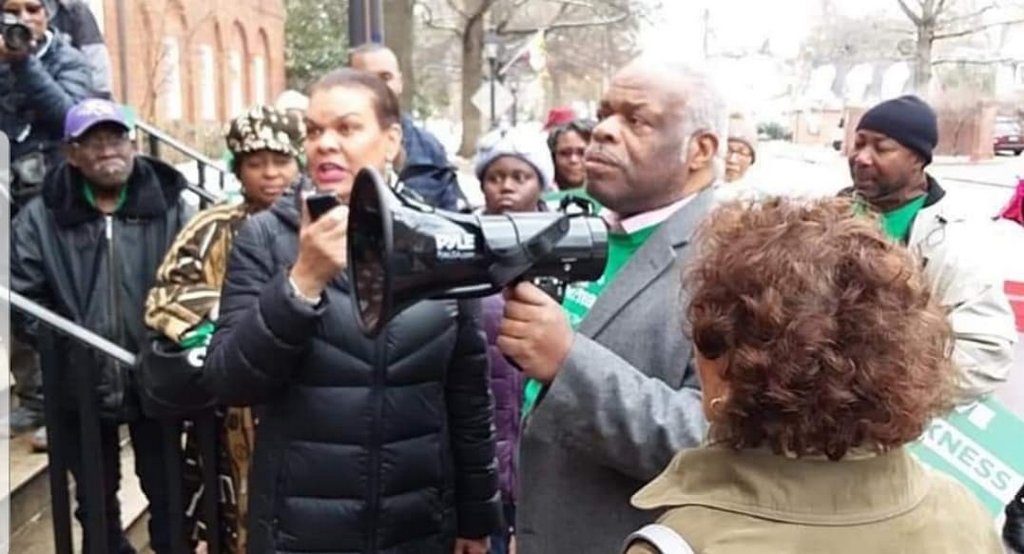[ad_1]
By Sean Yoes
AFRO Baltimore Editor
[email protected]
George Mitchell, an omnipresent figure in the Park Heights community of Northwest Baltimore died July 14, due to complications from a surgery. He was 66.
Mitchell, who operated the Langston Hughes Community, Business and Resource Center at 5011 Arbutus Ave., in lower Park Heights, allegedly entered the hospital approximately three weeks ago for a colonoscopy. However, Mitchell apparently had an adverse reaction to the anesthesia that was administered, which allegedly triggered a series of seizures. Doctors apparently opted to induce a coma in an attempt to relieve the onset of the seizures, but Mitchell ultimately succumbed.

“George Mitchell was a champion for Park Heights. Under his vision, the Langston Hughes Business, Community and Resources Center became a place where children came to read, speak foreign languages and play basketball and baseball,” Baltimore City Councilwoman Sharon Green Middleton, who represents District Six, which encompasses Park Heights, said in a statement. “He used the center as an incubator for small businesses and a place where older adults felt safe and respected. George Mitchell fed thousands of families and individuals every week from his center and was always looking to do more,” added Green Middleton, who worked closely with Mitchell.
“You could hear his laughter all over Park Heights and you could see and feel his influence in every issue that impacted the community. I will miss his wise words. I will miss my dear friend. He would want us to continue to look out for each other and look out for his beloved Park Heights.”
The Baltimore City Council had recently voted to clear the way for Mitchell to purchase the Langston Hughes Business, Community and Resource Center outright from the city. The center was literally steps away from where Mitchell lived in the community. Although he was a fixture in Park Heights, Mitchell was born in Florence, South Carolina, October 14, 1954. He moved to Baltimore with his mother when he was a small boy. He attended Lexington Terrace Elementary School, Pimlico Junior High School and graduated with honors from Merganthaler Vocational Technical High School in East Baltimore. He went on to attend Morgan State University where he was a member of the football team and a two-time MEAC wrestling champion. He graduated from Morgan in 1976.
“This is a tremendous loss for us all. George’s death leaves many a heavy heart in our city, particularly the Park Heights community,” Sen. Jill P. Carter, who represents the 41st District of Baltimore City, said in an email.
“George and I got close after he called to ask me to file an appeal to save the Langston Hughes Elementary School (Mitchell’s center is housed in the former elementary school). I was away on vacation at the time, but I heard his passion and felt his commitment so I said yes, and immediately stepped in as pro bono counsel for the appeal. We did not win that battle, but it is clear that God’s plan was for George to create the community center,” Carter added.
“George’s love for our children was his driver and for them, he made a miracle happen over there. The Langston Hughes Community Center has filled a hole in the soul of the community. I will miss his straightforward, no nonsense way of speaking to issues, particularly the decades long political neglect of lower Park Heights.” In addition to the community center, Mitchell was a real estate developer, a talk show host and owned several restaurants and other business ventures over the years.
Few loved Park Heights as much as Mitchell. However, he would have more than likely admitted Pam Curtis, community outreach coordinator at Park Heights Renaissance, was one of those people. According to Curtis, he and Mitchell “worked together every day” for the betterment of Park Heights.
“He was like a father to me, he was my mentor. He gave my sons their first jobs.” said Curtis during a phone conversation with the AFRO. At times during the conversation, Curtis was almost inconsolable as she grappled with the loss of her mentor.
“I was truly blessed and honored that he allowed me the privilege to be a part of his legacy. He was about his people; he provided housing, he provided employment, he wanted to break generational curses,” Curtis added.
“He was a part of the vision God has for Park Heights. Job well done.”
[ad_2]
Source link
